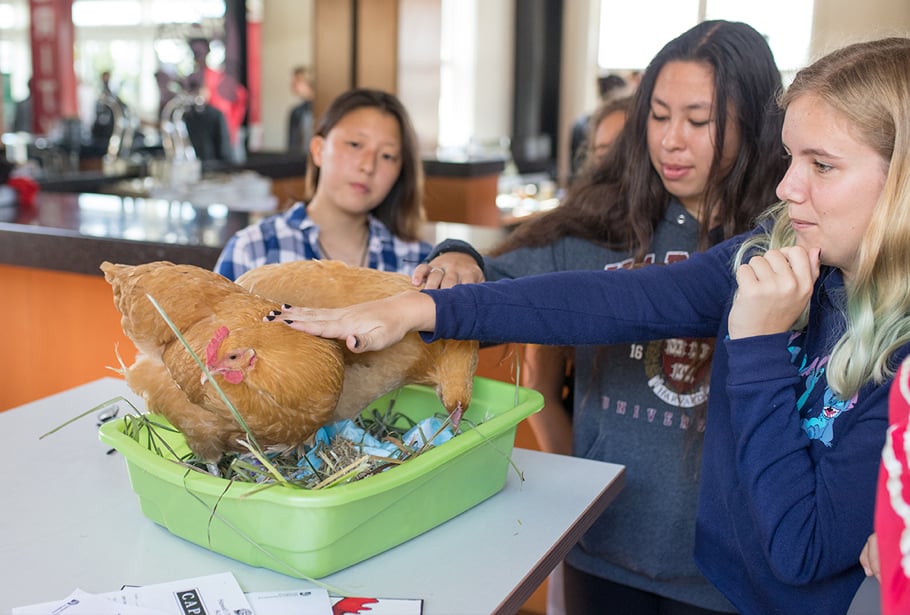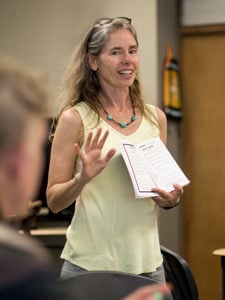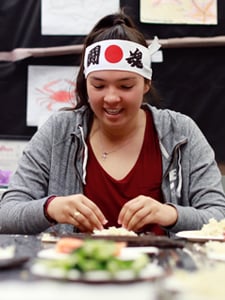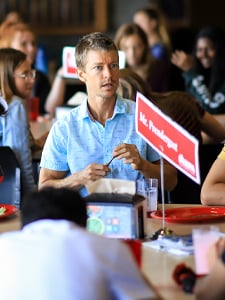Through our capstone program, HPA is breaking down the walls between school and the real world. We empower students to follow their interests and passions—and to make a positive impact on their communities in the process.”
Upper School capstone courses give you freedom to define a passion project; gain feedback from peers, teachers, and experts; and ultimately bring your work into the community to gauge its effectiveness and impact. The full capstone experience at HPA begins in Lower School, but is accessible to all students regardless of their entrance year. Where will your curiosity take you?
Capstone offerings for 2022-23
Agriculture and Design
There is great power in the simple but revolutionary act of putting your hands in the soil, and a careful observation of an ecosystem offers key insight into many of our worldʻs most pressing issues. If you seek social justice, want to be part of the climate change solution, or wish to fix our broken food system, this course may be for you. All of this and more is possible through the deepening of our relationship with the land. In Agriculture and Design, we will examine our food system through the lens of our unique environment and the agricultural system that fully sustained a thriving Native Hawaiian population. In addition, we will analyze our current industrial food production methods and experiment with alternative systems of regenerative agriculture that renew and restore the land. Through a deepening of our understanding of food, farming and our relationship with the land, we will design and implement projects, products, and outcomes that serve our community and the environment.
Data-Driven Entrepreneurship
Entrepreneurship these days is also about finding innovative and creative solutions to real problems. The most effective way to do this involves letting the world itself guide your solution through the feedback (data) it provides. The best solutions to interesting problems are not created in isolation, but rather employ a feedback model (like the lean startup model). Whether you’re trying to create a business, write a research paper, develop an app, or explore ways to promote sustainability, this class can help you by providing you with tools for collecting and analyzing data to shape your decisions. More generally, this capstone aims to help you develop a wide range of entrepreneurial skills and competencies that will be crucial for your future success in a wide range of fields. Your future starts now.
Experimental Lab Science
Science is driven by a sense of curiosity and wonder. In this capstone, students will learn how to ask insightful questions about the natural world around them, and then to design and execute laboratory experiments to explore possible answers to these questions. Research projects are likely to be centered in biotechnology, biology, biochemistry and/or chemistry. Students will develop and hone laboratory skills and techniques. Experimental results have the potential to add to the growing body of scientific knowledge and to be shared with the scientific community around the world.
Humans and Technology
Cavemen had stone tools and fire, you have a smartphone and the internet. How can you use these tools to create music no one has ever heard, to study the activity of your brain, or to land a spaceship on another planet? This is your chance to use advanced tools and technology to bring your vision, your dream into reality. What new possibilities exist for humans and technology? Three concepts are key to this capstone: autonomy: you create something all your own; mastery: you become the master of your creation, and a sense of purpose: what is your “why” and how does this leverage all of those dozen years you spent learning with others.
Ka Hana Noʻeau: Form, Function, and Cultural Practices
In many ways, a civilization’s intangible cultural heritage is linked to its traditional forms of craftsmanship. Crafts signify the evolution of existence, they point us towards the role of rituals and traditions. They tell stories of lives lived, of the past, of a way of being. In this course, students will be introduced to Hawaiian cultural practices and processes through a series of hands-on workshops and presentations. These experiences will include an introduction to native Hawaiian plants and their uses (medicinal & dying), farming and processing kalo, and the history and practice of Hawaiian wood surfboard crafting. Traditional methods and contemporary approaches will be discussed and demonstrated and the essential questions that guide each workshop will include the following. How do objects, places and designs shape lives and communities? What is the difference between art vs. craft? Why do artists & practitioners break from established traditions? The individual capstone projects for the course will be guided by the themes of the class.
Kaleidoscope
Identity interrogated. Culture curated. Race rejected. Place repatriated. Space subjugated. Words withheld. Existence exsanguinated. Equity yearned. Self-searching. Belonging explored. Beauty unclaimed. Shudder. Shatter. Rebuild. Reassemble. Rediscover. Mindful moments. Bellowed beats. Inclusion not illusion. This Capstone is amorphous. You are the glass in the kaleidoscope of you. Journey. Search. Explore. Examine. Play. Find. Identify. Defy. Fail. Overcome. Become. Who are you?
Marine Science and Advocacy
Sylvia Earle stated “I hope for your help to explore and protect the wild ocean in ways that will restore the health and, in so doing, secure hope for humankind. Health to the ocean means health for us.” Students in this course will explore the natural environment and investigate ways to protect the wild ocean through research, wonderment, and science. Student projects will be expected to contribute directly towards scientific knowledge and / or advocate for ocean health and resiliency through education or community based projects. Students are welcome to continue current projects or develop new areas of focus. Current projects available to students through HPA’s Marine Studies Program include coastal cleanups, fishing line recycling program, satellite telemetry of sea turtles, turtle facial recognition program, sea turtle monitoring and mapping and coral reef monitoring.
Public Policy and Implementation
The objective of this capstone is for students to recognize and magnify their influence on the local level through direct and legitimate means. To accomplish this goal, students will examine and select a social conflict impacting our community and then create a public policy outcome to assist in its rectification. This course’s outcomes will assist students interested in shaping various local affairs, ranging from politics to business and many avenues in between.
Sport and the Athlete
Students in this capstone can explore any aspect of the sports and athletic world. Possible areas of exploration can be nutrition, sports psychology, journalism, events, video/television, tools to support the athlete, and the influence of sports on society. Dr. Carol Dweck’s Mindset: The New Psychology of Success will be used as a jumping-off point to start conversations and discussions around current events in the sporting world.
The World Through My Eyes
In this immersion storytelling capstone, students practice research and nonfiction storytelling through immersion in an experience in order to share the story from the inside. We study conceptual frameworks for immersion stories and develop skills to access them, engage in real-world experiences, and share insights into life in our world. Your journalism or memoir product could be a book, a series of articles, a film, a podcast series, or a photo documentary. Bring your communication skills, big questions, media expertise, and creativity.




